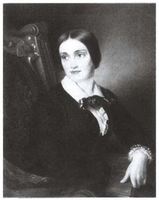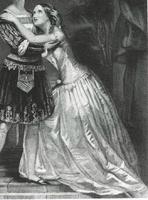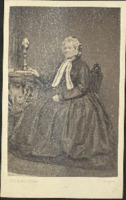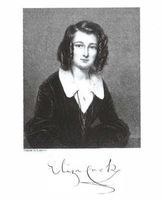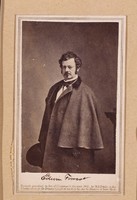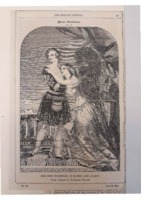Henry Cushman's A Historical and Biographical Genealogy of the Cushmans (1855)
Dublin Core
Title
Henry Cushman's A Historical and Biographical Genealogy of the Cushmans (1855)
Subject
Cushman, Charlotte Saunders, 1816-1876
Macready, William Charles
Muspratt, Susan Cushman, 1822-1859
Forrest, Edwin, 1806-1872
Actors and Actresses
Praise
England--London
Reputation
Cook, Eliza, 1818-1889
Actors and Actresses--English
Actors and Actresses--US American
Gender Norms
Fame
Description
The entry about Charlotte Cushman spreads across 15 pages. It quotes several accounts of the press, without, however, giving any sources. It is overwhelmingly positive and portrays Charlotte as a noble, ambitious, hard-working, and gifted actress.
The biographical sketch traces her family history and positions her as a descendent of a family with "indomitable energy and an untiring perseverance" (497). The first footnote indicates that the biographical sketch "was prepared by the kindness of a relative of Miss Charlotte" (497).
Recurring adjectives used for the characterization of her and her close relatives are honest, ambitious, noble, studious, cultivated, great, remarkable, strong, moral.
The sketch refers to Howitt's account and includes a farewell speech from 1852.
The biographical sketch traces her family history and positions her as a descendent of a family with "indomitable energy and an untiring perseverance" (497). The first footnote indicates that the biographical sketch "was prepared by the kindness of a relative of Miss Charlotte" (497).
Recurring adjectives used for the characterization of her and her close relatives are honest, ambitious, noble, studious, cultivated, great, remarkable, strong, moral.
The sketch refers to Howitt's account and includes a farewell speech from 1852.
Credit
Publisher
Little, Brown, and Company
Date
1855
Type
Reference
Auto/Biography Item Type Metadata
Text
Excerpts:
"The piece was repeated many nights, and then, with her fame established as far as New Orleans was concerned, she returned to New York, happy in the possession of a new path to fame and independence, and thinking, in her young imagination, that she was about to set the world on fire." (501)
"During this period, her sister Susan having married unfortunately, was left by her husband in destitute circumstances, with an infant child. To obtain a livelihood, by the advice of Charlotte she called into action her talent for theatrical representation. They together appeared on the Philadelphia stage, Charlotte, in some cases, acting the principal male part, and Susan the first female character in the play. This was considered by many a hazardous undertaing, but in the end it proved successful." (503)
"This engagement forms an era in the history of Miss Cushman of no slight importance, and one of which we may say with propriety she had great reason to be proud. It will be admitted by all that the eminent position of that great master, the professional station of Mr. Macready was the foremost in the art, that he might have chosen from the world's artists any partner in his triumphs he chose, and that the choice from so distinguished a person necessarily conveyed a compliment of no meanly insignificant order. Choosing Miss Cushman he selected her from all the world and together they achieved wonders." (503)
"Before leaving her native land she said, in the honesty of her heart, " I go to learn ; I go to see the great models ; I am a student not an artist ; I must see Rachel and those others who are great." Having, after her arrival, visited some of the principal places of interest in Europe in company with a small party of friends, she returned alone to London to put her fortune at once to the trial." "It was the depth of winter, and a remarkably cheerless, gloomy season too ; she was ill, not only with severe cold but from anxiety and uncertainty. Nothing could exceed the depression of her mind as she looked round on the vast multitude of London, herself as yet friendless there — and yet in this very London lay her fate, and from these very multitudes she had come to win love and admiration! " But she could not afford to waste time in brooding over her own sad thoughts. She received offers from the managers of Covent-Garden Theater — then open, from St. James, and one or two others; but here, again, a difficulty arose, which made her additionally unhappy. She knew not what was best or wisest for her to decide upon or do. However, the circumstance of Mr. Forrest coming to England afforded her an opportunity of performing her own peculiar characters with a better chance of success, and in the end she accepted an engagement at the Princess's, and resolved to make her debut before a London audience in the character of Bianca, in Milman's tragedy of Fazio. [...] The favor of the British public towards Miss Cushman knew no bounds ; high and low accorded to her praise, and the few, judicious and learned, and the mass, actuated by the heart and impulse, all cheered her on." (505)
"The London Sunday Dispatch precedes a very fine notice of Eliza Cook's poems, as follows:
"With considerable pleasure we find another edition of this lady's works before the public. * * * * A noble ' Dedication' now prefaces her volumes, and is among the choicest compositions that ever left the author's pen. The names of Eliza Cook and Charlotte Cushman are fitting ones to be associated in such honorable conjunction, and we congratulate the gifted American who has gained such 'love offering' from a gifted English woman. There are few who would not be greatly proud to be addressed in these lines" (506)
quoted from an unknowne source (press coverage of success in England): "Miss Cushman's fortune is made. The ball is at her foot. She is now incontestibly, by the suffrage of the British public, at the head of the British stage. It is very questionable, whether, in the opinion of the sounder portion of the critical public, she does not already stand above Macready." (507)
"She, therefore, in March 1852, took leave of the Boston stage by a " farewell engagement," and in May of the same year made her last appearance before a New York audience. We give her farewell speech on that occasion, for a copy of which we are indebted to Thomas Barry, Esq., of the Boston Theater.
"Retirement of Miss Cushman. — Miss Cushman, the
American actress, appeared for the last time before an American audience at the Broadway Theater, New York, on Saturday, the 15th of May. The play selected for the occasion was Guy Mannering, in which she performed in her great part of Meg Merrilies. At the close of the performance, in obedience to the call of the audience, she was led forward by Mr. Barry, the stagemanager, when she made her adieu in the following words, highly characteristic of the independent and self-reliant spirit of the speaker: " 'Ladies and Gentlemen, —I will not indulge in the cant of saying that this call was unexpected, or that I have come entirely unprepared for it. The custom of actors addressing audiences
is, I believe, " more honored in the breach than the observance." In olden times it was punished by forfeits or fines. I may seem and be antediluvian in my taste, but, for the sake of all concerned, I could wish the old fashion restored. For myself, I have but little to say; and if you find it not at all to the purpose, I must beg you, in your kindness and courtesy, to think that it's pretty well for a woman, especially one " unaccustomed to public speaking." On the 8th of April, 1835, then eighteen years of age, under the direction of the gentleman at my side, (Mr. Barry,) my first and last manager, I launched my tiny craft upon the sea of public opinion. In a course of alternate storms and calms, which has known no retrogression, but which has ever been onward —your approbation, among the earliest breezes that filled my sails — I have met many land rats and water rats, (pirates I mean,) cruisers under false colors, mermen and mermaids, rocks, shoals and quicksands. I had no compass but the examples of those gone before me —no pilot, save perseverance; but, with hope at the prow, a steadfast will at the helm, under the protection papers of an honest purpose, I have, after a seventeen years' voyage come safe into the port of friends' esteem, with the colors of independence nailed to the mast head. My labor has been earnest, incessant. The world little knows the labor of such a life, for none but an actor can know an actor's toil. In the public I have ever found a generous master. I believe you will award me the credit of having proved myself a faithful servant. For all those now struggling as I once struggled I ask of you the same approbation which cheered and encouraged me to the attainment of that proud professional and social position which I now enjoy. Allow me, then, to bid you a respectful and thankful farewell.' " (509-510)
"Having devoted much space to her professional history may we not add a word as to her social worth and private life. No less brilliant in the social circle than upon the stage, we find Miss Cushman beloved by all who know her best. In the development of her generous nature she is even now doing good and bestowing upon many the hard earned wealth at her disposal. However diligently she may amass money she expends it with lavish profusion, and makes all around her know her bounty, and whenever she sees an object worthy encouragement she is not backward in extending the influence for which she suffered, and, is in no degree, unwilling to assist genius in its struggles.
With a single extract from Miss Frederic Bremer's Homes inthe New World, we close this memoir. "I like Miss Cushman personally very much. One sees evidently in her an honest, earnest and powerful soul, which regards life and her vocation with a noble earnestness. She has, through great difficulties, made her own way to the position, which by universal recognition and with universal esteem, she now occupies. She belongs to an old Puritanic family, and after her father's misfortune she supported by her talent, for some years, her mother and her younger sister. She looks almost better in private than on the stage; the frank, blue eye, the strong, clever forehead and the honest, sensible expression of her whole demeanor and conversation make one like to be with her." In conclusion, we can say that the purity of her life and conduct are equal to her popularity and world-wide renown as an actress." (510)
"The piece was repeated many nights, and then, with her fame established as far as New Orleans was concerned, she returned to New York, happy in the possession of a new path to fame and independence, and thinking, in her young imagination, that she was about to set the world on fire." (501)
"During this period, her sister Susan having married unfortunately, was left by her husband in destitute circumstances, with an infant child. To obtain a livelihood, by the advice of Charlotte she called into action her talent for theatrical representation. They together appeared on the Philadelphia stage, Charlotte, in some cases, acting the principal male part, and Susan the first female character in the play. This was considered by many a hazardous undertaing, but in the end it proved successful." (503)
"This engagement forms an era in the history of Miss Cushman of no slight importance, and one of which we may say with propriety she had great reason to be proud. It will be admitted by all that the eminent position of that great master, the professional station of Mr. Macready was the foremost in the art, that he might have chosen from the world's artists any partner in his triumphs he chose, and that the choice from so distinguished a person necessarily conveyed a compliment of no meanly insignificant order. Choosing Miss Cushman he selected her from all the world and together they achieved wonders." (503)
"Before leaving her native land she said, in the honesty of her heart, " I go to learn ; I go to see the great models ; I am a student not an artist ; I must see Rachel and those others who are great." Having, after her arrival, visited some of the principal places of interest in Europe in company with a small party of friends, she returned alone to London to put her fortune at once to the trial." "It was the depth of winter, and a remarkably cheerless, gloomy season too ; she was ill, not only with severe cold but from anxiety and uncertainty. Nothing could exceed the depression of her mind as she looked round on the vast multitude of London, herself as yet friendless there — and yet in this very London lay her fate, and from these very multitudes she had come to win love and admiration! " But she could not afford to waste time in brooding over her own sad thoughts. She received offers from the managers of Covent-Garden Theater — then open, from St. James, and one or two others; but here, again, a difficulty arose, which made her additionally unhappy. She knew not what was best or wisest for her to decide upon or do. However, the circumstance of Mr. Forrest coming to England afforded her an opportunity of performing her own peculiar characters with a better chance of success, and in the end she accepted an engagement at the Princess's, and resolved to make her debut before a London audience in the character of Bianca, in Milman's tragedy of Fazio. [...] The favor of the British public towards Miss Cushman knew no bounds ; high and low accorded to her praise, and the few, judicious and learned, and the mass, actuated by the heart and impulse, all cheered her on." (505)
"The London Sunday Dispatch precedes a very fine notice of Eliza Cook's poems, as follows:
"With considerable pleasure we find another edition of this lady's works before the public. * * * * A noble ' Dedication' now prefaces her volumes, and is among the choicest compositions that ever left the author's pen. The names of Eliza Cook and Charlotte Cushman are fitting ones to be associated in such honorable conjunction, and we congratulate the gifted American who has gained such 'love offering' from a gifted English woman. There are few who would not be greatly proud to be addressed in these lines" (506)
quoted from an unknowne source (press coverage of success in England): "Miss Cushman's fortune is made. The ball is at her foot. She is now incontestibly, by the suffrage of the British public, at the head of the British stage. It is very questionable, whether, in the opinion of the sounder portion of the critical public, she does not already stand above Macready." (507)
"She, therefore, in March 1852, took leave of the Boston stage by a " farewell engagement," and in May of the same year made her last appearance before a New York audience. We give her farewell speech on that occasion, for a copy of which we are indebted to Thomas Barry, Esq., of the Boston Theater.
"Retirement of Miss Cushman. — Miss Cushman, the
American actress, appeared for the last time before an American audience at the Broadway Theater, New York, on Saturday, the 15th of May. The play selected for the occasion was Guy Mannering, in which she performed in her great part of Meg Merrilies. At the close of the performance, in obedience to the call of the audience, she was led forward by Mr. Barry, the stagemanager, when she made her adieu in the following words, highly characteristic of the independent and self-reliant spirit of the speaker: " 'Ladies and Gentlemen, —I will not indulge in the cant of saying that this call was unexpected, or that I have come entirely unprepared for it. The custom of actors addressing audiences
is, I believe, " more honored in the breach than the observance." In olden times it was punished by forfeits or fines. I may seem and be antediluvian in my taste, but, for the sake of all concerned, I could wish the old fashion restored. For myself, I have but little to say; and if you find it not at all to the purpose, I must beg you, in your kindness and courtesy, to think that it's pretty well for a woman, especially one " unaccustomed to public speaking." On the 8th of April, 1835, then eighteen years of age, under the direction of the gentleman at my side, (Mr. Barry,) my first and last manager, I launched my tiny craft upon the sea of public opinion. In a course of alternate storms and calms, which has known no retrogression, but which has ever been onward —your approbation, among the earliest breezes that filled my sails — I have met many land rats and water rats, (pirates I mean,) cruisers under false colors, mermen and mermaids, rocks, shoals and quicksands. I had no compass but the examples of those gone before me —no pilot, save perseverance; but, with hope at the prow, a steadfast will at the helm, under the protection papers of an honest purpose, I have, after a seventeen years' voyage come safe into the port of friends' esteem, with the colors of independence nailed to the mast head. My labor has been earnest, incessant. The world little knows the labor of such a life, for none but an actor can know an actor's toil. In the public I have ever found a generous master. I believe you will award me the credit of having proved myself a faithful servant. For all those now struggling as I once struggled I ask of you the same approbation which cheered and encouraged me to the attainment of that proud professional and social position which I now enjoy. Allow me, then, to bid you a respectful and thankful farewell.' " (509-510)
"Having devoted much space to her professional history may we not add a word as to her social worth and private life. No less brilliant in the social circle than upon the stage, we find Miss Cushman beloved by all who know her best. In the development of her generous nature she is even now doing good and bestowing upon many the hard earned wealth at her disposal. However diligently she may amass money she expends it with lavish profusion, and makes all around her know her bounty, and whenever she sees an object worthy encouragement she is not backward in extending the influence for which she suffered, and, is in no degree, unwilling to assist genius in its struggles.
With a single extract from Miss Frederic Bremer's Homes inthe New World, we close this memoir. "I like Miss Cushman personally very much. One sees evidently in her an honest, earnest and powerful soul, which regards life and her vocation with a noble earnestness. She has, through great difficulties, made her own way to the position, which by universal recognition and with universal esteem, she now occupies. She belongs to an old Puritanic family, and after her father's misfortune she supported by her talent, for some years, her mother and her younger sister. She looks almost better in private than on the stage; the frank, blue eye, the strong, clever forehead and the honest, sensible expression of her whole demeanor and conversation make one like to be with her." In conclusion, we can say that the purity of her life and conduct are equal to her popularity and world-wide renown as an actress." (510)
Location
Boston, MA, US
Geocode (Latitude)
42.3602534
Geocode (Longitude)
-71.0582912
Provenance
Hathi, https://hdl.handle.net/2027/wu.89062869995. Accessed 27 Feb, 2020.
Social Bookmarking
Geolocation
Collection
Citation
“Henry Cushman's A Historical and Biographical Genealogy of the Cushmans (1855),” Archival Gossip Collection, accessed April 24, 2024, https://www.archivalgossip.com/collection/items/show/193.


